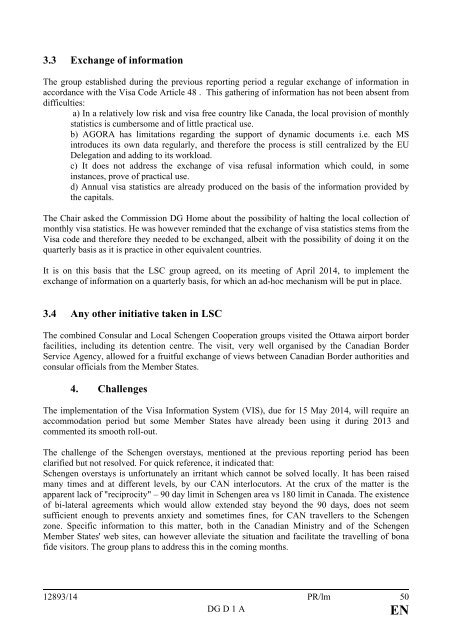eu-com-schengen-coop
eu-com-schengen-coop
eu-com-schengen-coop
Create successful ePaper yourself
Turn your PDF publications into a flip-book with our unique Google optimized e-Paper software.
3.3 Exchange of information<br />
The group established during the previous reporting period a regular exchange of information in<br />
accordance with the Visa Code Article 48 . This gathering of information has not been absent from<br />
difficulties:<br />
a) In a relatively low risk and visa free country like Canada, the local provision of monthly<br />
statistics is cumbersome and of little practical use.<br />
b) AGORA has limitations regarding the support of dynamic documents i.e. each MS<br />
introduces its own data regularly, and therefore the process is still centralized by the EU<br />
Delegation and adding to its workload.<br />
c) It does not address the exchange of visa refusal information which could, in some<br />
instances, prove of practical use.<br />
d) Annual visa statistics are already produced on the basis of the information provided by<br />
the capitals.<br />
The Chair asked the Commission DG Home about the possibility of halting the local collection of<br />
monthly visa statistics. He was however reminded that the exchange of visa statistics stems from the<br />
Visa code and therefore they needed to be exchanged, albeit with the possibility of doing it on the<br />
quarterly basis as it is practice in other equivalent countries.<br />
It is on this basis that the LSC group agreed, on its meeting of April 2014, to implement the<br />
exchange of information on a quarterly basis, for which an ad-hoc mechanism will be put in place.<br />
3.4 Any other initiative taken in LSC<br />
The <strong>com</strong>bined Consular and Local Schengen Cooperation groups visited the Ottawa airport border<br />
facilities, including its detention centre. The visit, very well organised by the Canadian Border<br />
Service Agency, allowed for a fruitful exchange of views between Canadian Border authorities and<br />
consular officials from the Member States.<br />
4. Challenges<br />
The implementation of the Visa Information System (VIS), due for 15 May 2014, will require an<br />
ac<strong>com</strong>modation period but some Member States have already been using it during 2013 and<br />
<strong>com</strong>mented its smooth roll-out.<br />
The challenge of the Schengen overstays, mentioned at the previous reporting period has been<br />
clarified but not resolved. For quick reference, it indicated that:<br />
Schengen overstays is unfortunately an irritant which cannot be solved locally. It has been raised<br />
many times and at different levels, by our CAN interlocutors. At the crux of the matter is the<br />
apparent lack of "reciprocity" – 90 day limit in Schengen area vs 180 limit in Canada. The existence<br />
of bi-lateral agreements which would allow extended stay beyond the 90 days, does not seem<br />
sufficient enough to prevents anxiety and sometimes fines, for CAN travellers to the Schengen<br />
zone. Specific information to this matter, both in the Canadian Ministry and of the Schengen<br />
Member States' web sites, can however alleviate the situation and facilitate the travelling of bona<br />
fide visitors. The group plans to address this in the <strong>com</strong>ing months.<br />
12893/14 PR/lm 50<br />
DG D 1 A<br />
EN












